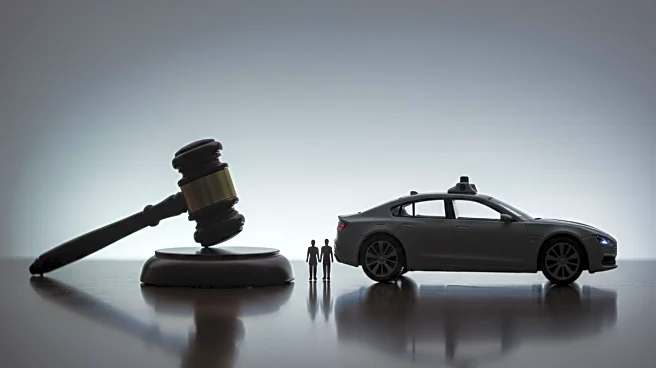What's Happening?
A class action lawsuit has been certified against Tesla, led by California drivers who allege that CEO Elon Musk misrepresented the self-driving capabilities of Tesla vehicles over an eight-year period. U.S. District Judge Rita Lin ruled that the question of whether Tesla's vehicles lacked necessary sensors for high-level autonomy justifies consolidating individual claims into a class action. The plaintiffs argue that Tesla falsely claimed its cars were equipped for full autonomy, particularly through its Full Self-Driving (FSD) technology package. Judge Lin noted that Tesla's marketing, which included claims on its website, blog, newsletter, and during quarterly earnings calls, suggested that its cars had hardware to achieve full self-driving. Tesla's unique marketing approach, which involves direct sales without dealers, was highlighted as a factor in the case.
Why It's Important?
The lawsuit has significant implications for Tesla and the broader automotive industry, particularly concerning the marketing and sale of autonomous vehicle technology. If the plaintiffs succeed, it could lead to increased scrutiny and regulation of how companies advertise self-driving capabilities. This case also highlights the potential legal risks associated with promoting advanced technology without sufficient evidence of its capabilities. For Tesla, a ruling against them could result in substantial financial liabilities and impact consumer trust. The outcome may influence how other automakers approach the marketing of autonomous features, potentially leading to more conservative claims and greater transparency.
What's Next?
The class action will proceed, covering California Tesla owners who purchased the FSD package between May 19, 2017, and July 31, 2024, and opted out of Tesla's arbitration agreements. The legal process will involve examining the evidence presented by both sides, including Tesla's marketing materials and the plaintiffs' claims of misrepresentation. Stakeholders, including Tesla, other automakers, and regulatory bodies, will be closely monitoring the case for its implications on the future of autonomous vehicle marketing and sales practices.
Beyond the Headlines
This case may prompt broader discussions about consumer protection in the context of emerging technologies. Ethical considerations regarding transparency and accountability in tech marketing could become more prominent. The lawsuit could also influence public perception of autonomous vehicles, potentially affecting adoption rates and investment in related technologies.








